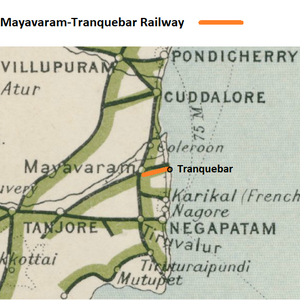Mayavaram-Tranquebar Railway: Difference between revisions
New page all checked |
Full revision, replacing incorrect information, map added |
||
| Line 1: | Line 1: | ||
The '''Mayavaram-Tranquebar Railway''' was a 19 mile (30km) metre gauge([[Rail_gauge_#Metre_Gauge|MG]]) line linking the former Danish settlement of [[Tranquebar]] | The '''Mayavaram-Tranquebar Railway''' was a 19 mile (30km) metre gauge([[Rail_gauge_#Metre_Gauge|MG]]) line linking the former Danish settlement of [[Tranquebar]] with [[Mayavaram]] where it connected with the [[South Indian Railway]](SIR) MG Network. | ||
<ref> | <br>The line was under construction in May 1926 <ref> British Library ‘India Office Records’ L/F/7/2595 "Terms for incorporating of certain District Board Lines” </ref> and opened on 25 Nov 1926 <ref>”Marvels of the South Indian Railway 1859-1951” by Southern Railway, Chennai, July 2010 page 276</ref> and was a owned by [[Tanjore District Board]] and worked by the [[South Indian Railway]](SIR) | ||
[[File: Mayavaram-Tranquebar Railway.png|thumb| Mayavaram-Tranquebar Railway]] | |||
<ref>[ | Until the railway opened in 1926 passengers to [[Tranquebar]] were required to use the [[Karaikkal-Peralam Railway]] to the Porear Road Station to the north of French town of [[Karaikkal]]. Then to use “road conveyance to Tranquebar, 7 miles distant (North) on good metalled roads. Jutkas and bullock-carts can be had at the station” | ||
<ref>[https://books.google.co.uk/books?id=MOhiCgAAQBAJ&pg=PT188&lpg#v=onepage&q&f=false “The Illustrated Guide to the South Indian Railway” by the South Indian Railway Company Ltd , first published by Higgenbottom, Madras 1900, pdf page 188 referring to the French town of Karaikkal (Karaikal) ]; Retrieved 3 Jun 2019</ref>. | |||
==Later History== | |||
The metre gauge line closed in 1999 and it was proposed to convert to broad gauge. The Hindu Newspaper report of 2012 gives the date of opening of the ‘Mayiladuthurai-Tharangambadi Railway’ (the modern names for the towns of Mayavaram and Tranquebar ) as 1902 <ref>[http://www.thehindu.com/todays-paper/tp-national/tp-tamilnadu/line-between-mayiladuthurai-and-tharangambadi-must-be-revived-bjp/article2833714.ece ‘The Hindu Newspaper’ 26 January 2012]; Retrieved 3 Jun 2019</ref>. ''This date is not correct''; 1926 as referenced is correct. | |||
== References == | == References == | ||
| Line 17: | Line 14: | ||
[[Category:Railways]] | [[Category:Railways]] | ||
[[Category:State Railways]] | [[Category:State Railways]] | ||
[[Category:District Railway Boards]] | |||
Revision as of 10:29, 3 June 2019
The Mayavaram-Tranquebar Railway was a 19 mile (30km) metre gauge(MG) line linking the former Danish settlement of Tranquebar with Mayavaram where it connected with the South Indian Railway(SIR) MG Network.
The line was under construction in May 1926 [1] and opened on 25 Nov 1926 [2] and was a owned by Tanjore District Board and worked by the South Indian Railway(SIR)

Until the railway opened in 1926 passengers to Tranquebar were required to use the Karaikkal-Peralam Railway to the Porear Road Station to the north of French town of Karaikkal. Then to use “road conveyance to Tranquebar, 7 miles distant (North) on good metalled roads. Jutkas and bullock-carts can be had at the station” [3].
Later History
The metre gauge line closed in 1999 and it was proposed to convert to broad gauge. The Hindu Newspaper report of 2012 gives the date of opening of the ‘Mayiladuthurai-Tharangambadi Railway’ (the modern names for the towns of Mayavaram and Tranquebar ) as 1902 [4]. This date is not correct; 1926 as referenced is correct.
References
- ↑ British Library ‘India Office Records’ L/F/7/2595 "Terms for incorporating of certain District Board Lines”
- ↑ ”Marvels of the South Indian Railway 1859-1951” by Southern Railway, Chennai, July 2010 page 276
- ↑ “The Illustrated Guide to the South Indian Railway” by the South Indian Railway Company Ltd , first published by Higgenbottom, Madras 1900, pdf page 188 referring to the French town of Karaikkal (Karaikal) ; Retrieved 3 Jun 2019
- ↑ ‘The Hindu Newspaper’ 26 January 2012; Retrieved 3 Jun 2019